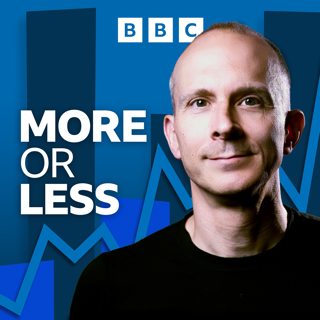
What can economics learn from sport?
The great theories of economics seem to have great explanatory power, but the actual world is often far too complicated and messy to fully test them out. Professor Ignacio Palacios-Huerta, an economist at the London School of Economics has an answer – sport. In the contained setting of competitive sport, he says, the rules are clear and you know who is doing what. This means, with some analysis, you can see vibrant illustrations of well-known economic theories playing out before your eyes. Ignacio talks to Tim Harford about some of his favourite economic theories, demonstrated in action in sporting competition.Presenter: Tim Harford Producer: Natasha Fernandes Series producer: Tom Colls Production co-ordinator: Katie Morrison Sound mix: John Scott Editor: Richard Vadon
2 Nov 20248min

Are older drivers more dangerous?
Could the cut in winter fuel payments cost thousands of lives? Is it really true that criminals sentenced to three years will be out of prison in two months? Are older drivers more dangerous than young ones? Do Southeastern Railway shift 50 million leaves from their lines?Tim Harford investigates some of the numbers in the news.Presenter: Tim Harford Reporters: Bethan Ashmead Latham and Nathan Gower Producer: Natasha Fernandes Series producer: Tom Colls Production co-ordinator: Katie Morrison Sound mix: James Beard Editor: Richard Vadon
30 Okt 202428min

Is Trump right about violent crime in Venezuela and the US?
On the campaign trail for the US presidency, former president Donald Trump has been saying that the US is becoming a more dangerous than Venezuela.He also claims that the crime data for the US that the FBI collects is missing the most violent cities. Is he right? Tim Harford investigates, with the help of Bastian Herre from Our World in Data and Jay Albanese from Virginia Commonwealth University.Presenter: Tim Harford Producer: Bethan Ashmead Latham Series producer: Tom Colls Production co-ordinator: Katie Morrison Sound Mix: Annie Gardiner Editor: Richard Vadon
26 Okt 202410min

Do US crime statistics miss out the most violent cities?
Was an MP wrong about the number of people who pay capital gains tax?Why is 2% the magic number for the rate of inflation?Donald Trump says US crime figures are fake. Are they?How do you work out how many buffaloberries a bear eats in a day?And we fact-check a claim about the prevalence of suicide among GPs. For information and support follow this link: https://www.bbc.co.uk/actionlineTim Harford investigates some of the numbers in the news.Presenter: Tim Harford Reporters: Nathan Gower and Bethan Ashmead Latham Series Producer: Tom Colls Production co-ordinator: Katie Morrison Sound mix: Rod Farquhar Editor: Richard Vadon
23 Okt 202428min

Nobel prize: Why are some countries so much richer than others?
The question of why some countries are rich and some poor has been described as the most important question in economics. Perhaps that is why the Royal Swedish Academy of Sciences awarded the Nobel Memorial Prize in Economics to Daron Acemoglu, Simon Johnson and James Robinson for their work on the importance of institutions in the economic fortunes of nation states. Tim Harford explains the economic theory that underpins their award.Presenter: Charlotte McDonald Reporter: Tim Harford Producer: Bethan Ashmead Latham Series producer: Tom Colls Production co-ordinator: Katie Morrison Sound mix: Giles Aspen Editor: Richard Vadon
19 Okt 20248min

When are numbers like a horse at a gymkhana?
Can we teach BBC political editor Chris Mason some new maths skills? Do 60 of the UK’s richest people pay 100% tax? Have water bills fallen in real terms since 2010? When it comes to HPV and cervical cancer, is zero a small number?Tim Harford investigates some of the numbers in the news.Presenter: Tim Harford Producers: Nathan Gower and Bethan Ashmead Latham Series producer: Tom Colls Production co-ordinator: Katie Morrison Sound mix: Sarah Hockley Editor: Richard Vadon
16 Okt 202428min

Uncertainty, probability and double yoked eggs
Professor Sir David Spiegelhalter is one of the great communicators of probability and uncertainty. His new book, The Art of Uncertainty, explains how to approach uncertainty, luck, probability and ignorance. Tim Harford talks to Sir David about double yoked eggs, the Bay of Pigs, and his top tips for politicians who want to communicate evidence and uncertainty. Presenter: Tim Harford Series producer: Tom Colls Production co-ordinator: Katie Morrison Sound mix: John Scott Editor: Richard Vadon
12 Okt 20248min

Should the government target persnuffle?
Are childhood obesity rates going down? Do 35 million birds die every year in the UK after hitting windows? How much money could the Chancellor find by changing the debt rule? And Professor Sir David Spiegelhalter contemplates the probability of his own conception.Tim Harford investigates some of the numbers in the news, and in life. Presenter: Tim Harford Reporter: Charlotte MacDonald Producers: Bethan Ashmead Latham, Natasha Fernandes and Nathan Gower Series producer: Tom Colls Production co-ordinator: Katie Morrison Sound mix: Neil Churchill Editor: Richard Vadon
9 Okt 202427min





















